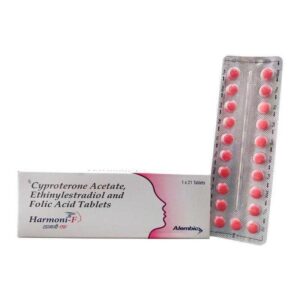FOLIC ACID + ETHINYL ESTRADIOL + CYPROTERONE ACETATE ETHINYLOESTRADIOL
Folic Acid: Folic acid, also known as vitamin B9 or folate, is a synthetic form of folate that is used as a dietary supplement or medication. It is essential for the production of red blood cells and DNA synthesis. Folic acid is mainly prescribed to treat or prevent folate deficiency, which can cause anemia and other health problems.
The mechanism of action of folic acid involves its conversion to its active form, tetrahydrofolate (THF). THF is an important cofactor in several enzymatic reactions involved in the synthesis of nucleotides (the building blocks of DNA), amino acids, and other essential molecules. By having an adequate supply of folic acid, the body is able to carry out these processes efficiently.
Folic acid is available in various doses, typically ranging from 400 to 800 micrograms (mcg) for adults. The specific dose recommended by a healthcare professional may depend on the underlying condition being treated or prevented. It is usually taken orally, with or without food, once daily or as directed.
While folic acid is generally considered safe, it may cause mild side effects in some individuals. These can include nausea, diarrhea, abdominal cramps, headache, and a bitter taste in the mouth. In rare cases, allergic reactions can occur, characterized by symptoms such as itching, swelling, or difficulty breathing. It is essential to seek immediate medical attention if any severe or persistent side effects occur.
It is worth noting that folic acid supplements are particularly important for pregnant women as they help prevent certain birth defects, such as neural tube defects. Adequate folate intake is crucial before and during pregnancy. However, it is advisable to consult with a healthcare professional for personalized advice on the appropriate dosage and duration of folic acid supplementation.
Ethinyl Estradiol: Ethinyl Estradiol is a synthetic form of the hormone estradiol, which is a type of estrogen. It is commonly used as a component of hormonal contraceptives, such as birth control pills, patches, and rings. It is also prescribed for the treatment of menopausal symptoms and certain gynecological conditions.
The primary mechanism of action of ethinyl estradiol is its ability to inhibit ovulation, preventing the release of an egg from the ovaries. Additionally, it thickens the cervical mucus, making it difficult for sperm to reach the egg. It can also alter the lining of the uterus, reducing the likelihood of implantation of a fertilized egg.
The dose of ethinyl estradiol can vary depending on the specific product being used. In combination oral contraceptives, it is typically combined with a progestin and is taken daily for 21 days, followed by a period of no hormone pills for 7 days. The dose ranges from 20 to 50 micrograms per tablet.
Like any medication, ethinyl estradiol can cause side effects. Common side effects include nausea, headache, breast tenderness, and breakthrough bleeding. Some women may experience mood changes, weight gain, and changes in sexual desire. In rare cases, serious side effects such as blood clots, stroke, and heart attack can occur, especially in women who smoke or have certain medical conditions.
It is important to consult a healthcare provider before starting ethinyl estradiol or any hormonal contraceptive to discuss the potential risks and benefits based on individual health history.
Cyproterone Acetate Ethinyloestradiol: Cyproterone Acetate Ethinyloestradiol is a combination medication that is primarily used as an oral contraceptive pill. It contains two active ingredients: cyproterone acetate, which is a progestogen, and ethinyloestradiol, which is an estrogen.
The combination of these hormones in the medication works by preventing the release of eggs from the ovaries (ovulation) and thickening the cervical mucus, making it harder for sperm to reach the uterus. It also alters the lining of the uterus, making it less receptive to the implantation of a fertilized egg.
The typical dose of Cyproterone Acetate Ethinyloestradiol is one tablet taken daily for 21 consecutive days, followed by a break of 7 days before starting the next pack. It is important to take the medication at the same time each day to maintain its effectiveness.
Common side effects of Cyproterone Acetate Ethinyloestradiol include nausea, breast tenderness, headache, mood changes, weight gain, and changes in menstrual bleeding patterns. Some women may also experience a decrease in libido or difficulty wearing contact lenses. Serious side effects are rare but can include blood clots, high blood pressure, liver problems, and increased risk of certain cancers.
It is important to note that Cyproterone Acetate Ethinyloestradiol should be used under the guidance of a healthcare professional and is not suitable for everyone. It should not be used by women who are pregnant, breastfeeding, have a history of blood clots or certain cancers, or have uncontrolled high blood pressure. It is important to discuss any existing medical conditions or medications with a healthcare provider before starting this medication.

